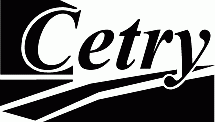
Cetry Service: Plasma Treatment
RF-plasma treatment is a well-established method for obtaining improved surface bonding and wettability, especially in case of polymeric surfaces. Cetry offers limited in-house plasma- and vacuum-treatment services. Some are listed below.
Click on ABOUT in order to contact us about the possibilities for your research.
Plasma Treatment
Bonding and surface wetting investigation
Drying and melting under vacuum
Related Pages:
Examples of Modelling, Characterization & Problem SolvingExamples of Equipment Development
Plasma Treatment
Cetry is able to offer a limited set of plasma treatments. It concerns gasdicharges of maximum 120 Watts in a 77-liter metal vessel, run at long-wave frequencies, variable between 70 kHz and 300 kHz. We are able to monitor local temperatures in situ. The following standard treatments are offered:
- Oxygen treatment - e.g. for introduction of hydroxyl and carbonyl functional groups to polymeric surfaces
- Air treatment - e.g. for introduction of hydroxyl, carbonyl and amine functional groups to polymeric surfaces
- Water vapour treatment - e.g. for dominant introduction of hydroxyl groups to polymeric surfaces
Other gases can be run on request - turn around time may be longer - e.g.:
- Helium
- Argon
- Laughing gas (N2O)
- Nitrogen
Our customers appreciate this service, since they generally have no equipment available for research purposes. An often used scenario is: You send the samples to us, with instructions and requests - we do the desired plasma treatment and return the processed samples - you analyse the effectiveness in light of your application, etc. The return samples are accompanied by a test report that covers all significant processing parameters and in-process control results.
return to top...
Bonding and surface wetting investigation
Problems with adhesive bonding tend to haunt design and assembly of polymeric-based (medical) devices. The problems arrise from matters such as insufficient surface wetting, insufficient cleanliness, wrong chemical composition of the polymer surface / adhesive, etc. Cetry is able to assist with analysis and improvement of surface wetting in relation to adhesive bonding, as well as with evaluation of adhesives, bonding methods (e.g. UV lighting for UV-curable adhesives), and surface modification for improved bonding strength. We can also help with the evaluation of aging of bonds, fuses and seals. Do not hesitate to contact us about the possibilities to address your adhesive bonding and sealing problems.
- Characterization of adhesive bonds, fuses, seals
- Study of curing and drying of adhesives
- Evaluation of stress and strain in adhesive bonds
- Evaluation of wettability properties of surfaces
- Improvement of bonding
- Aging tests of bonds and seals
- Evaluation of the impact on bonding caused by handling, storage and transportation - e.g. surface contamination caused by examination gloves
return to top...
Drying and melting under vacuum
The vacuum chamber of the plasma unit can also be used for vacuum drying experiments and melting under vacuum. The latter prevents oxidation of the material on the one hand, and allows for more intensive drying than without melting. This service is generally appreciated by developers of specialty polymeric materials such as biodegradable excipients and hydrogel components.
return to top...